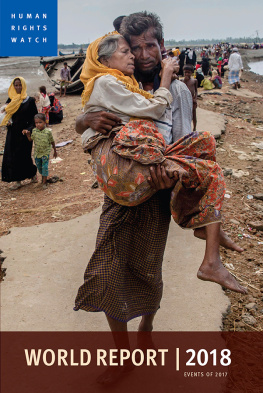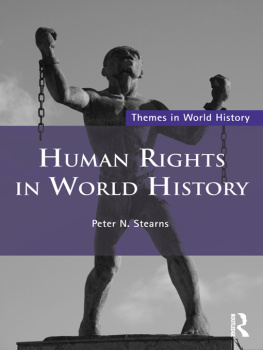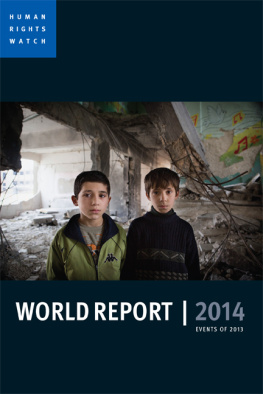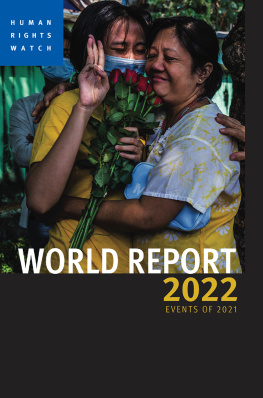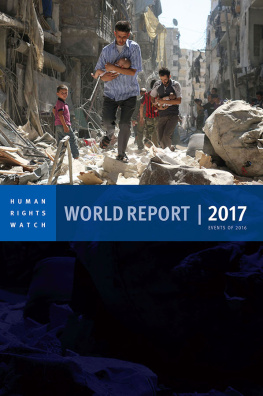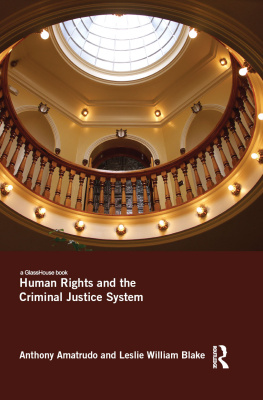THE MASSEY LECTURES SERIES
The Massey Lectures are co-sponsored by CBC Radio, House of Anansi Press, and Massey College in the University of Toronto. The series was created in honour of the Right Honourable Vincent Massey, former Governor General of Canada, and was inaugurated in 1961 to provide a forum on radio where major contemporary thinkers could address important issues of our time.
This book comprises the 2017 Massey Lectures, In Search of a Better World: A Human Rights Odyssey, broadcast in November 2017 as part of CBC Radios Ideas series. The producer of the series was Philip Coulter; the executive producer was Greg Kelly.
PAYAM AKHAVAN
Payam Akhavan is a Professor of International Law at McGill University in Montreal, Canada, a Member of the International Court of Arbitration, and a former UN prosecutor at The Hague. He has served with the UN in conflict zones around the world, including Bosnia, Cambodia, Guatemala, Rwanda, and Timor-Leste, and as legal counsel in leading cases before the International Court of Justice, the International Criminal Court, the European Court of Human Rights, and the Supreme Courts of Canada and the United States. His prior academic appointments were at Oxford University, University of Paris, the European University Institute, University of Toronto, and Yale Law School. He earned his Doctor of the Science of Jurisprudence at Harvard Law School, and his widely cited academic publications include Reducing Genocide to Law, from Cambridge University Press. He served as Chair of the Global Conference on Prevention of Genocide and is a founder of the Iran Human Rights Documentation Centre; his groundbreaking human rights work has been featured on BBC Worlds Hardtalk , CBC s Ideas , and Brazils TV Globo, and in Macleans magazine and the New York Times . In 2005, he was selected by the World Economic Forum as a Young Global Leader. Payam Akhavan was born in Tehran, Iran, and migrated to Canada with his family in his childhood.
IN SEARCH OF A BETTER WORLD
A Human Rights Odyssey
PAYAM AKHAVAN
Copyright 2017 Payam Akhavan and
the Canadian Broadcasting Corporation
Published in Canada and the USA in 2017 by House of Anansi Press Inc.
www.houseofanansi.com
All rights reserved. No part of this publication may be reproduced or transmitted in any form or by any means, electronic or mechanical, including photocopying, recording, or any information storage and retrieval system, without permission in writing from the publisher.
Distribution of this electronic edition via the Internet or any other means without the permission of the publisher is illegal. Please do not participate in electronic piracy of copyrighted material; purchase only authorized electronic editions. We appreciate your support of the authors rights.
Library and Archives Canada Cataloguing in Publication
Akhavan, Payam, author
In search of a better world : a human rights odyssey / Payam Akhavan.
(Massey lectures)
Issued in print and electronic formats.
ISBN 978-1-4870-0200-8 (softcover). ISBN 978-1-4870-0201-5 ( EPUB ).
ISBN 978-1-4870-0202-2 (Kindle)
1. Human rights. 2. International law and human rights. 3. Akhavan,
Payam. I. Title. II. Series: CBC Massey lectures series
JC571.A343 2017 323 C2017-901295-9
C2017-901296-7
Library of Congress Control Number: 2016958331
U.S. ISBN : 978-1-4870-0339-5
Series design: Bill Douglas
Cover design: Alysia Shewchuk
Cover image: Antonio masiello/offset.com

We acknowledge for their financial support of our publishing program the Canada Council for the Arts, the Ontario Arts Council, and the Government of Canada through the Canada Book Fund.
For K & K, the light of my eyes.
CONTENTS
Chapter One:
The Knowledge of Suffering
Chapter Two:
The Pursuit of Global Justice
Chapter Three:
The Will to Intervene
Chapter Four:
The Oneness of Humankind
Chapter Five:
The Spirit of Human Rights
Notes
Bibliography
Acknowledgements
Index
I wish I could show you,
when you are lonely or in darkness,
the astonishing Light of your own being.
Hafez
ONE
THE KNOWLEDGE OF SUFFERING
FROM TEHRAN TO TORONTO
I SPEAK A LITTLE ENGLISH. I like Canada. Nice to meet you. I had rehearsed those words carefully, repeating them like a sacred mantra. It was a long journey from Tehran to Toronto. At first, the hours went by quickly. Like all children flying in airplanes, I was in a euphoric trance. But I was growing impatient to arrive. I needed to meet those foreigners called Canadians and practise the English phrases I had memorized.
There was no in-flight entertainment in those days, except the view from the window seat. I persuaded my older brother, Dariush, to vacate the prized location, using the time-tested technique of incredibly annoying behaviour. I didnt take the opportunity lightly. As the self-appointed sentry for Iran Air, I kept a vigilant watch, observing each and every object visible from those sublime heights, ready to report suspicious activity to the control tower.
Thirty thousand feet is an ideal altitude to wander and dream. When explored from a safe distance, the world is an enchanting but deceptive place. The word exile was not yet part of my linguistic repertoire. The idea of religious persecution was still beyond the realm of my experience. I didnt know at the time that I was about to enter the crucible of suffering that teaches us the true meaning of words. As the land of my birth slowly disappeared over the horizon, I glanced one last time at an innocent past. I had a vague premonition that I would never return to the home I once knew.
When setting out on a journey, do not seek advice from someone who never left home. That was the timeless wisdom of Rumi, the mystical poet of ancient Persia, the land of my ancestors. As children, we needed a safe home so our imagination could wander to distant places, unconstrained by fear. Adventures could be had, effortlessly and endlessly, without expectations and calculations, until it was time to sleep, and even then, our dreams would sustain us until the light of morning. But one day I would awaken to find myself in a strange place, far from home, desperately lost in the wilderness. In that place, I would struggle to find the words, to explain where I had come from, and why part of me was left behind; it seemed that nobody understood what I was trying to say. Knowledge, I was told, was a theoretical abstraction, and purpose a liberal platitude. There was no need to feel deeply, no need to be broken open.
The fate of modern times, the German philosopher Max Weber wrote, is characterized by rationalization and intellectualization and, above all, by the disenchantment of the world. Emancipated from the mimicry of irrational traditions, the demystified mind was poised to conquer the truth, looking down from the commanding heights of utilitarian objectivity. The man of the European Enlightenment was no longer part of the universe; he was on top of it. Henceforth, intellectual ideas would substitute intense experiences, and reason rather than reflection would discover reality through detached observation. By the twentieth century, the unprecedented catastrophes of total war and genocide had exploded modernitys myth of progress. Just as the scientific mind had dispassionately discovered the secrets of the outward universe, the horrors of the Holocaust forced a chastened humanity to rediscover the mystical universe of the inner self. The cornerstone of the new postwar civilization was the idea of human rights of a being with an intrinsically noble essence. In a secular world, it was a reminder of that which must remain sacred.


